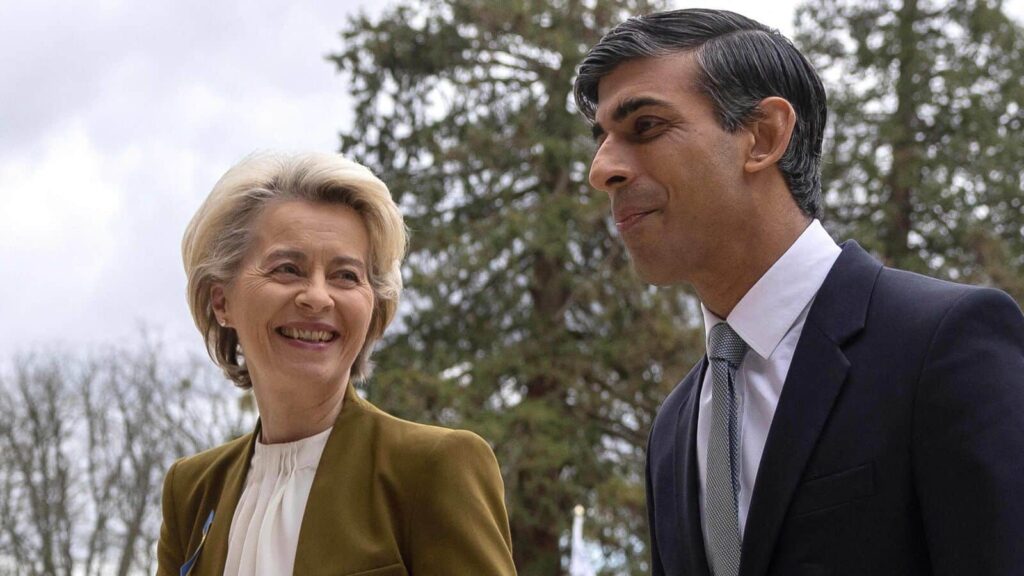British’s PM Rishi Sunak and EU chief Ursula von der Leyen clinch Brexit deal over Northern Ireland trade

Dither, dawdle and delay: the deal has been waiting there “on the cusp”, but at last the patient European Commission president, Ursula von der Leyen, arrived to sign. What caused the hold-up? In Brussels they feared that every passing day allowed Brexit fantasists to further rally their troops. Meanwhile, Rishi Sunak prevaricated in fear of his headbangers and the Democratic Unionist party held him to ransom by paralysing the government at Stormont.
But before everyone plunges deep into Northern Irish politics, the details of the protocol and this deal’s diplomatically subtle wording, remember this: all the deal does is prevent Brexit turning into the trade war that Boris Johnson built into his hand-grenade protocol bill. Slight easements on the Irish sea border and better relations with our neighbours still leave Britain and its great Brexit calamity much where it was, but at least no worse off.
Sunak has no choice but to stand up to the insatiable impossibilists of Brexit, but Theresa Villiers, a former Northern Ireland secretary, is right that it’s “crucial” that parliament gets a vote on the deal, as Sunak says it will. Will it pass? Sunak shouldn’t shun relying on Labour votes if that’s what it takes, though the Tory rebels may be overclaiming the size of their army as they mark out their red lines. When Mark Francois, the chair of the European Research Group (ERG), said “we’re not stupid”, sniggers had to be stifled;
but when he called for EU law to be “expunged” from Northern Ireland, when Jacob Rees-Mogg said DUP agreement was essential and when the DUP’s Sammy Wilson demanded the deal met its seven tests, it was not stupid, but dangerous. Those tests block anything the EU could ever agree to. But wait and see: the EU’s refusal to budge means that with whatever face-saver, sooner or later the DUP will have to relent.
Cunning words hammered out over hundreds of Brussels hours say the new deal “overlays” the old protocol, but doesn’t replace it – which means the old text still lurks beneath, keeping the European court of justice as ultimate arbiter, something both the ERG and DUP were determined to avoid. The Telegraph’s Beyond Brexit Bulletin asks, “Is Rishi Sunak trying to pull a fast one?” Stormont is politely offered a “say” in future EU laws affecting it, and even a “brake”, if Westminster agrees, but never a veto over the EU’s 27 member countries.
The pressure is on to meet April’s 25th anniversary of the Good Friday agreement, in the hopes that President Biden will come over to celebrate, and even open the door a crack to a US trade agreement. Labour can help ensure the deal passes in parliament, but this anniversary would be forlorn if the DUP still blocks the assembly.
What bad faith if the unionists reveal they never meant to abide by the spirit of power-sharing, or only while they commanded the top post. Peter Hain, a former Northern Ireland secretary, argues that assembly salaries should be stopped while its doors are closed, but the DUP’s default setting is “No”. That may be rational, not stupid, given that its identity is threatened: its veto is its only power as shifting demographics now make unionists the minority. The young grow less sectarian, and expect a united Ireland soon.
Here’s the real irony: for all its political problems, the original protocol that the unionists reject has brought Northern Ireland the best of all worlds, with open access to the UK and to the enormous EU single market across its border now denied to the rest of Britain. This has brought in high foreign direct investment, only exceeded by London. The region’s top foreign investment sectors – software, IT, business and professional services, communications and media – all grew in 2021, exceeding pre-pandemic investment.
The National Institute of Economic and Social Research finds Northern Ireland has “better trade and investment conditions as part of the EU’s single market and customs union”, as “closer links with the EU, through trade and also potentially labour mobility, have benefited Northern Ireland post-Brexit”. Despite price rises for some British goods, economic modelling shows the protocol improves Northern Ireland’s performance: output is expected to rise by 2.2% more than if there had been no Brexit. (Meanwhile, Brexit loses the UK 4%, according to the Office for Budget Responsibility.)
As manufacturers gain access to both the EU and UK markets, take the example of one company in the town of Maghera, whose owner, Michael McGrath, was interviewed by Reuters. CSP makes spare parts for the quarry sector and it can deliver next day to Poland or Germany, winning trade from rival British suppliers that are delayed by Brexit red tape. McGrath says the protocol is directly responsible for a 32% jump in revenues, and it is preparing to take on eight more staff.
If Sunak had an ounce of backbone he would proclaim this success to the unionists. But in their tangle of contradictions, Brexiters dare not for fear it exposes how much better off the whole UK would be had it stayed in the single market. Nowhere was “get Brexit done” defined, as the leave originators had no idea what they wanted beyond “out” –
so they just keep demanding an ever purer and harder Brexit. Joining the European Free Trade Association or staying in the single market were much better options, admitted now by some leading leavers such as Daniel Hannan. But most extreme leavers in denial about Brexit’s damage have nowhere to go, so they keep banging their heads harder against the walls they built.
Nor have they any rational explanation for Johnson negotiating and lauding the protocol, yet now abusing it to try to lever himself back into No 10. He prowls and growls, weighing up whether Brexiters have the numbers to bring Sunak down, while his praetorians, the Conservative Democratic Organisation, threaten deselection revenge on any MPs who helped eject Johnson: Damian Green is perhaps an early casualty.
Step back from this madness and remember that this new “deal” only rubs a few rough edges off the Northern Ireland border dilemma. A new green lane letting goods straight through destined for Northern Ireland will ease checkpoints, and Westminster will set state aid rules and VAT rates. Look, pets can cross the Irish sea without a passport.
Sunak’s “success” over this limited deal leaves Britain as bereft as ever by Brexit. Putting the pin back in the Johnson hand grenade bill will allow us to rejoin Horizon for vital scientific cooperation, but the economic damage remains. Rees-Mogg’s retained EU law (revocation and reform) bill still gives ministers arbitrary powers to abolish about 4,000 regulations on food,
safety or the environment without consultation or votes: that will make EU trade as difficult as possible as we diverge from their standards. So let no one imagine that Monday’s choreographed signing, grip-and-grins, nor even the king’s gracious blessing, will undo the monumental self-harm of Brexit – for which Boris Johnson, who swindled and defrauded us, bears most responsibility





